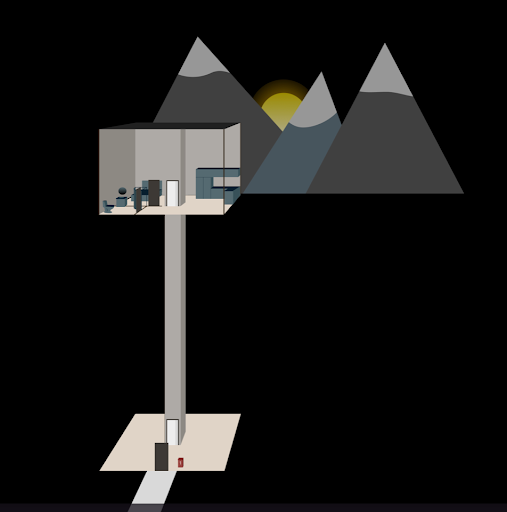Hello!
Thanks for all the positive feedback on the last issue. Chatting with AI can be pretty interesting, but it still can’t beat talking to an interesting human. Especially one like this week’s Q&A guest, Christian Landgren.
Christian is one of Sweden’s most influential tech leaders and programmers. He’s the CEO of Iteam, a digital innovation agency he founded in 1995 at just 17 years old. Christian is entirely self taught in both programming and running a business, and that’s led him to make some pretty bold decisions. Like only working with clients that are actively shaping a more positive, sustainable future. And building an app that had the Swedish police knocking at his door.
These two decisions formed the basis of mine and Christian’s conversation. They led us down some pretty thought-provoking 🐇 holes, and left me feeling grateful for all the courageous yet compassionate leaders out there. We need more of them.
You once said developers are your heroes. Why is that?
Because they understand where the world is headed better than anyone else. I've met 1000s of people within politics and civil society, and it feels like everyone is trying to figure out who's in charge of the future. But so far, I haven't found anyone that understands where we're headed better than developers. That's a lot of power and responsibility for a group to have, for sure, and it raises some important questions. Like, how do we ensure that more people understand the power developers have? And how do we ensure that developers and everyone in the tech industry reflect on that responsibility? It shouldn't be a weight on our shoulders; rather, it should be something from which we derive encouragement and meaning. But we need to start by acknowledging it.
What makes developers so adept at understanding where the world is headed?
First of all—in some sense—it will be developers that form the future. Everyone spends more time in their digital worlds, especially after the pandemic. The other part has to do with the way developers learn. Developers are so used to dealing with dynamic or complex, unsolved problems. For example, a strange error or bug will suddenly appear in the code, and you need to find a way to fix it. Or someone asks you to develop an algorithm to optimise traffic flow, and you've no idea how to do it, but you will still end up solving it. That's pretty much standard procedure for us. It's quite different from an expert role in, say, construction, where you might spend your entire career refining how to solve one specific type of problem.
The advantages of being in a constant state of complex problem-solving are adaptability and collaboration. No one's encountered the problem before, so as a team, you have to break it down into smaller chunks to understand it. You have to test your assumptions and learn as you go. The world's most important problems are complex, and this is precisely the mindset we need if we're going to solve them.


You've built your company around values rather than strategy. And you've run it this way for nearly 30 years. Why did you decide to do this?
I remember the moment well. We were due to sit down and create a business plan. But instead, we thought we could try to answer the question, 'why are we coming to work every day?' A shortlist of twenty reasons emerged. We grouped them down to three and have stuck with them ever since. We've had plenty of moments to ask ourselves whether they need to change, but we always ended up back where we started:
Create value
Have fun
Do something good
We can derive pretty much any decision from these three values. They influence the clients and projects we choose because we want to work on projects that enable us to achieve all three. We've even used them to back out of a high-value client contract. At the time, everyone in the company was working on it and becoming physically and mentally exhausted. On top of that, the team didn't feel like the effort was leading to a high-value, positive outcome. So we backed out. Losing the revenue was risky, but it wasn't worth losing our employees.
There are a lot of ways to do good. And a lot of important problems to solve. How do you prioritise where to spend your time?
That's a good question. We haven't fully figured it out. We just try to have a lot of open discussions as a team and choose wisely. Right now, we're thinking a lot about the role of AI in energy and climate optimisation.
Personally, I worry for the future of our kids. So if I had to choose, climate change is where I'd spend the most time. But ageing populations is another one. In 10 years, Sweden will have a population that's 10 years older. How will we take care of all these people with fewer healthcare workers? Again, technology has a huge role to play here, especially when it comes to helping people live healthier lives and preventing sickness.
In 2021, you spent quite a bit of time thinking about schools. And you ended up with the Stockholm police knocking at your door. Can you tell us what happened and why this story is significant?
The short answer is that Stockholm City Council spent too much time and money building a terrible app for schools in Stockholm. A group of parents and I were frustrated by the awful user experience. So we decided to tap into the app's APIs and build a new, open-source version instead. Stockholm City filed a police report because they thought this constituted a data breach. It didn't, and in the end, we were allowed to keep running it. But it caused quite a ruckus!
Why was the original app such a failure? Simple: they tried to decide on all the requirements upfront and did zero user testing. Over a ten-year project that cost them +100 million euros! A classic example of how not to build modern software products. The app was supposed to reduce administration and improve communication between teachers and parents, but it had the opposite effect. So everyone hated using it. The original intention behind it made a lot of sense, but the solution they built didn't because they applied the wrong process.
After the public controversy died, I tried to understand why these situations occur. I realised the answer might lie in our mental model for building things. Humans have spent a lot of time figuring out how to build physical things, so we try to apply that process to building digital things. But that's a mistake. Because the digital world doesn't operate under the same constraints as the physical world.
Imagine you're designing a digital house. What would that house look like if you removed all the physical constraints? Like a foundation. Maybe you'd start by building one apartment first. You'd sell it, let folks move in, and then build the next room based on their feedback. If you kept going this way, the final house would probably be quite different from the one you initially imagined. The point here is: we should not limit ourselves to the constraints of the physical world when designing in the digital world. This is what it means to be truly 'agile.'
Let's return to the school app project. You chose to open source the code so others could access what you built. What’s the benefit of this approach?
The school app story is a perfect example of how open source projects can increase collaboration and efficiency across the private and public sectors. Today, any Swedish municipality can plug into our app by offering open APIs. The problems facing Swedish schools are not unique, so why shouldn't they benefit from the same underlying technology?
I'd love to see the same principle applied to public procurement processes for digital products. To return to my house metaphor: instead of trying to build the whole digital house from the get-go with one set of builders, start by letting one vendor build the foundation. Get some feedback, and then allow other vendors to continue building on this house together with the existing vendors. This open-source approach allows everyone to peer into the construction process—to provide feedback and learn from each other. And once that house is built, it's much easier to copy it and move it to a new town. Imagine how much different public organisations would learn and how much money they would save if the sector procured technology in this way?
You need to go one step further and actually change someone's life. That's the ultimate success criteria.
How else can the tech and non-profit sectors come closer together?
First, by jointly embracing curiosity. The tech industry tends to think its solutions are applicable in more places than they actually are. Not every problem can be solved by another app. But the more you listen to users, the more you realise that the problem is more complex than you originally thought. And that's a good thing. You can only find the best uses of technology by understanding people.
Second, by jointly focusing on value. It's dangerous to talk about the possible futures that we could have without actually trying to build them. Take the example of drone deliveries in rural Sweden. You could talk about the concept, prove it's possible, and gain public interest. But unless you get out there and test the idea and identify the real hurdles, you will not create real value for people. You need to go one step further and actually change someone's life. That's the ultimate success criteria.
What three media have had the most impact on you as a leader and why?
2 Minute Papers on Youtube - a perfect way to follow the latest AI research and get a feel for what’s coming next.
Derek Silver’s TED talk on how to start a movement - it’s so much more impactful to be the first follower instead of trying to be in the centre.
Hacker News - what I open every morning to understand the world.
More questions for Christian? Hit him up on Twitter @Landgren. And check out the recording of this talk. It’s how I found out about Christian and why I decided to invite him as a guest.
Thanks so much for reading,
Lauren


